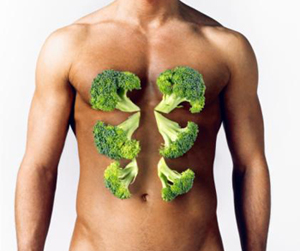This Ruins Most Diets
by Marc David

Just a few weeks ago I received a message from a frustrated individual who was on a quest to lose some weight. Maybe you've asked yourself this very question but it always starts off with "I want to lose weight." Then it follows up with their calorie calculations (what they need a day) and ends with the situation where they are only eating minimal calories a day. At this point, they get confused as to why eating less and less doesn't speed up the weight loss.
Sample Question:
"Over the past few years, I have consumed minimal calories. I have come to learn that this is my problem, my body is in survival mode. I came up with my Base Metabolic Rate. My results come to 3170.45 for TDEE (total daily energy expenditure). I would assume I haven't been consuming more than 1000 calories a day, give or take.
Is it true that I can gradually work my way up to 2170-2670 calories, not change my workout, and have better results than at my current caloric intake? If this is the case, I'm not sure I understand why."
They cut and cut calories, see no changes, nearly starve and then give up entirely. This person asked what most people wonder but never have the courage to seek out the answer. Suppose...
If I could give you a more effective nutritional strategy that would "outperform" the approach you are currently using, would you be interested? If so, let's talk metabolism!
First, you are in a state of homeostasis. This is the body's automatic tendency to maintain a relatively constant internal environment. In your case, exercising more and cutting more calories will cause your body to adjust "survive" by making constant changes in order not to lose any more critical body fat or weight. As you said, you are in "survival mode." You are in homeostasis and nothing is going to change unless you understand metabolism. At this point, your body is not about to release any stored fats. It needs all it has to sustain life!
Second, metabolism is just a name for the many chemical process that happen every day that are necessary for the maintenance of life. The process of breaking down food into energy and building up of new cells and all that is our metabolism.
Consider this fact:
There are two phases of metabolism; anabolism and catabolism. Both occur simultaneously all the time but at different magnitudes. Let's keep this simple shall we?
Anabolism - The build up phase Catabolism - The breakdown phase
If you are not eating enough to sustain your body's process and feeding it the required nutrients, you are mostly likely in a heighten state of catabolism. This means you'll build less muscle, your metabolism will be slower and changes will not be in your favor. A slow metabolism isn't what you want for your situation.
As an individual who wants to lose weight and make changes thru exercise and diet, you should be striving for a larger degree of anabolism.
Don't worry it's not complicated. All I'm saying is, 1000 calories a day in your case is well below your base metabolic rate, so low that your metabolism is slower then it could be and your in a state of catabolism where the changes you want to see (more muscle, less fat) aren't as likely to occur.
But what about this? "You must be in a calorie deficit to burn fat."
1000 calories is beyond a deficit. It's putting your body on empty. A deficit is like being 50 cents short each day and having to get the smaller sized coffee. But reserve to empty is having to borrow money from your friend or give the business an IOU.
Here's the secret: You need to eat more!

You see by eating more calories and more frequently you are going to raise your metabolism. By raise your metabolism you will change the state of homeostasis you are currently experiencing. By eating more and more frequently, you will be able to achieve a higher level of anabolism. When you are anabolic, you can build more muscle. By having more muscle, you'll raise your metabolism. By having a higher metabolism, you'll burn more fat. Burning more fat could end up in you losing the bad weight and building up some good weight. My strong hunch is...
"Is it true that I can gradually work my way up to 2170- 2670, not change my workout, and have better results than at my current caloric intake?"
Indeed this is true. Your body will have the fuel it needs for the workouts, it will be able to build up more often (anabolism) but you'll be in a slight calorie deficit meaning you are burning more calories then you are consuming but at a rate where your body feels it can let go of stored fat.
So it all adds up to this...
If you aren't consuming enough calories, your metabolism will slow down. The slower it gets, the less change you will see. While you want to be in a calorie deficit (defined as 10-20% below maintenance levels) you don't want to be in a starvation mode where your metabolism is so slow, you cannot lose a single pound (survival instinct).
By consuming the correct amount of calories per day, you will see faster gains, you'll lose fat and build more muscle.
Copyright 2006 Marc David
About The Author:
 Marc David is an innovative fitness enthusiast and the creator of the "The Beginner's Guide to Fitness And Bodybuilding" method on www.Beginning-Bodybuilding.com. He can show you how to reduce your body fat thru diet, how to gain weight or create more muscle thru an abundance of workout tips by training LESS! Not more. He dispels many "bodybuilding myths", tells you what most people never realize about nutrition, and what the drug companies DON'T WANT YOU to know. Go to: http://www.Beginning-Bodybuilding.com to find out more about The Beginner's Guide to Fitness And Bodybuilding.
Marc David is an innovative fitness enthusiast and the creator of the "The Beginner's Guide to Fitness And Bodybuilding" method on www.Beginning-Bodybuilding.com. He can show you how to reduce your body fat thru diet, how to gain weight or create more muscle thru an abundance of workout tips by training LESS! Not more. He dispels many "bodybuilding myths", tells you what most people never realize about nutrition, and what the drug companies DON'T WANT YOU to know. Go to: http://www.Beginning-Bodybuilding.com to find out more about The Beginner's Guide to Fitness And Bodybuilding.
More Articles by Author Marc David
Return to the Workout Articles Archive
|